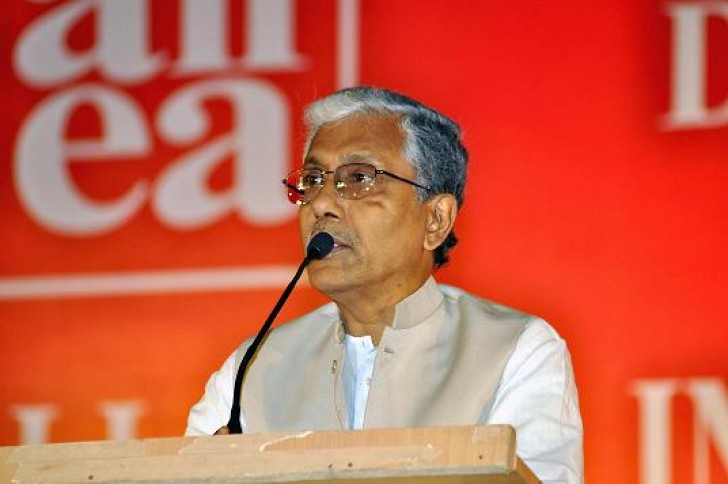
Why 4-time Tripura CM Manik Sarkar is an outlier in Indian politics
Septuagenarian Sarkar’s self-exit has set a rare precedent in the nation's politics, which is driven by the notion that politicians should neither tire nor retire

Four-time Tripura Chief Minister Manik Sarkar will not contest the coming assembly elections as the CPI (M) has gone for a generational shift in the state, fielding 24 new faces. The 74-year-old Sarkar is still the most popular Marxist face in Tripura and is rigorously campaigning for the February 16 battle.
Respecting his wish to opt out which he conveyed to the Politburo, Sarkar’s name was not included in the youth-packed list of 46 candidates the CPI (M) announced on Wednesday night.
The party has set aside 13 seats for its ally Congress and extended support to an independent, senior lawyer Purushottam Roy Barman, in Agartala’s Ramnagar seat.
Rare gesture
Sarkar’s self-exit has set a rare precedent in Indian politics, which is driven by the notion that politicians should neither tire nor retire.
Among a few such parallels that immediately come to mind is a similar retirement plan charted by another illustrious Left leader, the late Jyoti Basu, at a time when he was the most redoubtable face of the party in Bengal.
Basu stepped down as Chief Minister in 2000, barely a few months ahead of assembly elections, to pass the baton to Buddhadeb Bhattacharjee.
Taking a cue from Sarkar, two more veteran CPI (M) leaders and former Ministers, Badal Chowdhury and Tapan Chakraborty, too have decided against contesting elections.
Their decisions are in line with the age bar set by the party’s Central Committee in 2021 to infuse fresh blood in the organisation.
Age bar
The age bar on principle is 75 years but the party made an exception in the case of Kerala Chief Minister Pinarayi Vijayan.
The CPI (M) Tripura unit wanted a similar exception for Sarkar considering the popularity he still enjoys in the state.
Tripura’s Left Front Chairman Narayan Kar and CPI(M) state Secretary Jiten Chowdhury made several attempts to persuade Sarkar to change his mind, party sources said.
“The state unit did not make public his retirement request to the politburo till the announcement of the list, hoping against hope that he will change his mind,” said a senior Marxist leader.
New faces
CPI (M) sources, however, admitted that Sarkar’s decision made it easier for the party to bring in several new faces and drop veteran leaders.
Only seven of the party’s 15 outgoing MLAs were re-nominated.
In the absence of Sarkar, Jiten Chowdhury is likely to become the party’s Chief Ministerial face.
Apart from being the state General Secretary, he is also currently the President of the Ganamukti Parishad, the tribal wing of the party.
The party will try to send across the message of tribal-non-tribal harmony by making him the Chief Ministerial face to counter the demand for a Greater Tipraland raised by Tipra Motha, the party floated by Pradyot Debbarma, the scion of the state’s erstwhile royal family.
BJP woos tribal party
Union Home Minister Amit Shah and Assam Chief Minister Himanta Biswa Sarma met Debbarma in New Delhi on Wednesday to discuss his “Greater Tipraland” demand in a desperate bid to get Motha’s support for the BJP.
The nascent party has made significant inroads in tribal areas that account for 20 of the state’s 60 assembly seats.
There is a strong feeling in the CPI (M) that Chowdhury could be the perfect counter to the separatist demand. But it has fielded him from Sabroom, a general seat, instead of his pocket borough Manu, an ST reserved constituency.
“The message is clear. The party wants to project him as a face of communal harmony as he is equally popular among tribals and non-tribals,” said senior Tripura journalist Sitangshu Ranjan Dey.
Some feel that Chowdhury’s elevation could turn Sarkar’s retirement as a blessing in disguise for the CPI (M).
Fingers crossed
Most CPI (M) leaders in Tripura, however, are keeping their fingers crossed, pointing out that “renunciations” in the past had come back to haunt the party as “historic blunders”.
Jyoti Basu pulled out of the Prime Ministerial race in 1996 to respect the majority decision in the party that was against leading a coalition government with just 32 MPs. The party still quietly regrets the decision.
The second blunder was made when the Left parties disassociated from the UPA government in 2008 over the India-US nuclear deal.
Politically, it marked the beginning of the Left downfall in West Bengal.
The CPI (M)-led Left Front tally was reduced to 15 in the 2009 Lok Sabha elections from 35 in 2004. The Trinamool Congress’ numbers rose from 1 to 19.
The last thing the CPI (M) will want now is to end up regretting its decision of going to elections in Tripura without its most popular face.


